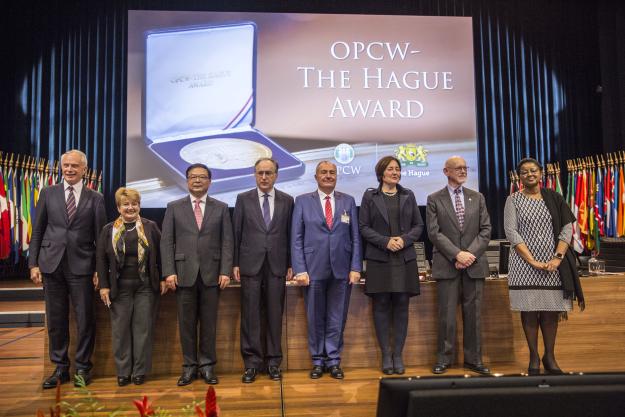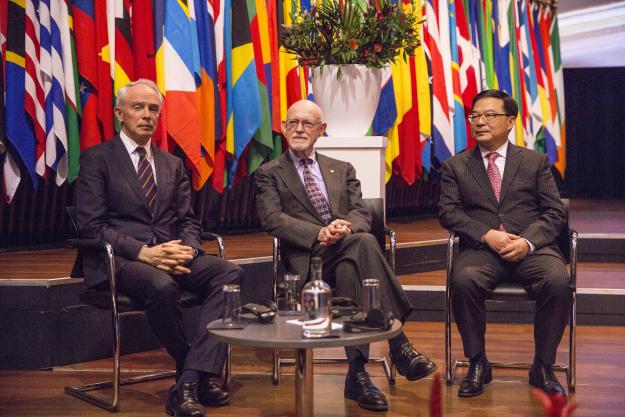
THE HAGUE, Netherlands —25 November 2019 — The OPCW-The Hague Award was presented to three recipients today during a ceremony held during the Twenty-Fourth Conference of States Parties to the Chemical Weapons Convention. The award recognises individuals and institutions that have made an outstanding contribution towards the goal of a world permanently free of chemical weapons.
During the ceremony, OPCW’s Director-General, H.E. Mr Fernando Arias, congratulated the award recipients and stated: “The winners of this award have earned our admiration through their sustained and devoted efforts in chemical disarmament and the peaceful uses of chemistry. Our mission is an enduring one. It requires constant vigilance and action. This year’s recipients will surely inspire others to take up this noble mission.”
The Award, which is also supported by the Municipality of The Hague, highlights the deep-rooted collaboration between the OPCW and its host country, the Netherlands, in countering the threat posed by chemical weapons and honouring actors involved in implementing the provisions of the Chemical Weapons Convention.
In her remarks, the Deputy Mayor of the City of The Hague, Saskia Bruines, said: “I am extremely proud to be able to present this prestigious award here in The Hague. We are celebrating the special work of the OPCW, the 2013 Nobel Peace Prize winner. This important international organisation has been located in The Hague for over twenty years. The mission of the OPCW can be traced back to the first Hague Peace Conference in 1899 where a ban on certain chemical weapons was declared. Now, a hundred and twenty years later, and with the help of this year’s winners of the 2019 OPCW- The Hague Award, we are closer than ever to a world free of chemical weapons.”

The Winners of the 2019 OPCW-The Hague Award
These statements were followed with acceptance speeches from the three winners.
Dr Robert Mikulak, the former Permanent Representative of the United States to the OPCW, stated: “The CWC establishes the very important norm, which prevents chemical agents being used in warfare. Science can and has been misused and perverted, and I have found ways to counter that by bridging the gap between scientists and politicians. The OPCW-The Hague Award will help me to continue this important work.”
Mr Cheng Tang, an expert on chemical demilitarisation from the People’s Republic of China, said: ‘’We are now living in an era of unprecedented scientific advancement and technological innovation with equally unparalleled access to, and diffusion of, scientific knowledge. As science can both improve and potentially undermine the ability to maintain an effective disarmament regime, it is imperative to strengthen the science review process and evaluate its implications for the Chemical Weapons Convention.”
The award for the International Union of Pure and Applied Chemistry (IUPAC) was accepted by President-elect Prof. Christopher Brett. He said: “IUPAC is extremely honoured to be a recipient of the highly prestigious OPCW-The Hague award. It represents recognition of IUPAC’s strong and lasting cooperation with OPCW to serve humankind through contributing knowledge and advances in the science and technology of chemistry at the worldwide level, helping to achieve the goals of CWC, as well as providing OPCW with the tools and materials for informing society about the responsible uses of chemistry.”
Background
Dr Robert Mikulak
Dr Robert Mikulak (United States of America) is an eminent expert on chemical and biological weapons arms control and the former Permanent Representative of the United States to the OPCW from 2010 to 2015. Dr Mikulak has made substantial contributions to chemical disarmament through his extensive involvement in the negotiations of the CWC, and his work as the US representative to the OPCW Preparatory Committee. Currently, he is a member of the OPCW Scientific Advisory Board (SAB) and is an expert advisor on chemical and biological weapons issues at the United States Department of State.
Mr Cheng Tang
Mr Cheng Tang (People’s Republic of China) is an expert on chemical demilitarisation. He is currently the Chair of the OPCW Scientific Advisory Board (SAB) and an advisor to the Chinese National Authority. Involved in the text negotiations of the CWC in Geneva from 1990 to 1992 as well as the removal and destruction of Syria’s chemical weapons, Mr Tang has actively worked for the goal of a world free of chemical weapons.
International Union of Pure and Applied Chemistry (IUPAC)
The International Union of Pure and Applied Chemistry (IUPAC) is an international federation of chemists that was established in 1919. Consisting of members, associates, and affiliate institutions from around the world, the organisation played an instrumental role in the development and promotion of The Hague Ethical Guidelines on Chemistry. IUPAC has actively cooperated with the OPCW to produce educational materials, teaching modules and joint-OPCW symposia on CWC related topics. A strong advocate for the peaceful uses of chemistry, IUPAC has provided extensive and longstanding support to the OPCW in promoting the objectives of the CWC.
In 2013, the Organisation for the Prohibition of Chemical Weapons (OPCW) was awarded the Nobel Peace Prize in recognition of its extensive efforts to eliminate chemical weapons.
To preserve the legacy of this achievement, the OPCW established the OPCW-The Hague Award in collaboration with the Municipality of The Hague in 2014.
The OPCW-The Hague Award recognises individuals and institutions that have made an outstanding contribution towards the goal of a world permanently free of chemical weapons.
